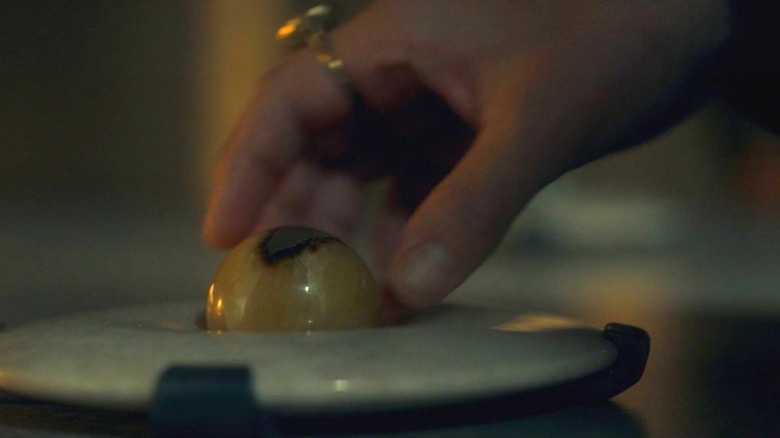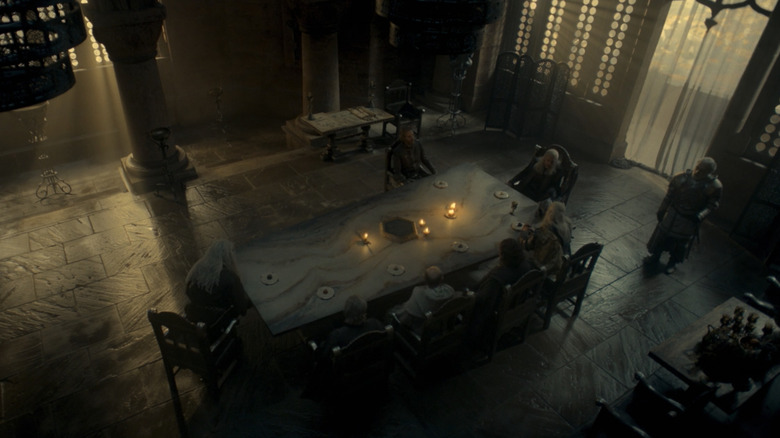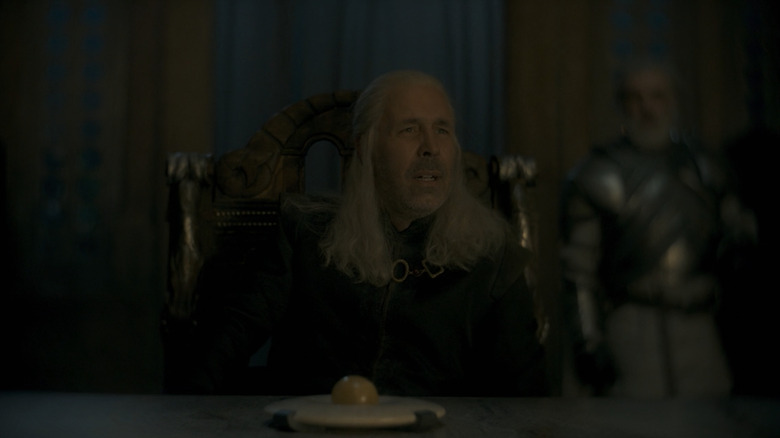Those Little Balls During The House Of The Dragon Council Scenes Sum Up The Best Part Of The Show
I am utterly obsessed with one little detail in "House of the Dragon."
The show's first episode, "The Heirs of the Dragon," features a plethora of scenes centered on the Small Council in King's Landing. Viewers of "Game of Thrones" are very familiar with the Small Council, which is essentially Westeros' equivalent to a Cabinet meeting. The king sits around with his appointed group of leaders of various branches of the kingdom, and they discuss and debate the various matters concerning the realm, from taxes to celebrations.
The series premiere of "House of the Dragon" institutes something we never saw on the show's predecessor. When the various members of the Small Council arrive at the meeting, they grab what looks to be a large marble off of a little platform in the center of the table and then place it in the middle of a circular dish located at their seat.
Set decorator Claire Nie Richards told The Hollywood Reporter that the balls are used to represent "the council coming in and being part of the meeting," a medieval punch card if you will. Co-creator and co-showrunner Ryan Condal was just as taken with them as I was, saying:
"I thought it was really cool. It's a way of visualizing the set formality of the Small Council chamber. It's enjoyable; we should have things that we like in this world."
So, why does a detail like this, which really doesn't have any bearing on the plot or figure into the episode's most explosive moments, please me so? Well, it taps into the part of brain that got me interested in the world of "Game of Thrones" in the first place. It's about process.
The intrigue amongst the fantasy
Fantasy is probably my least favorite genre. A world of magic, creatures, prophecies, and all that jazz rarely activates my particular pleasure centers when it comes to narrative fiction. The further away from a tangible reality we get, the more I lose interest. When I first fired up "Game of Thrones" all those years ago, I fully expected to not click with it and put it alongside things like "Lord of the Rings," stuff that people love that wasn't my thing. Not only did I like "Game of Thrones," but I was bewitched by it. I would watch episodes multiple times before the next one aired, do full rewatches of the show leading up to every new season, and the long waits between seasons became agonizing.
So, why was this different? In its early days, "Game of Thrones" was not much of a fantasy show. It was a political intrigue show. All of the best moments were people sitting around, dealing and scheming about power. Yeah, there was the threat of ice zombies on the horizon, but I wanted conversations about how much money the crown borrowed from the Iron Bank of Braavos. The Small Council was always the best place for scenes like this because it was their job to frankly discuss these things, but what makes it wonderful is the setting, which forces the participants to put on the air of civility even if they are teeming with rage at their fellow Council members.
"House of the Dragon" ups the civility by taking place at a time where the realm has not been thrown into chaos by the usurping of a monarch. We get to see what a proper Small Council with an attentive king looks like.
A tradition waiting to be broken
This is why the balls are so fascinating to me. They add to the decorum of the proceedings, a symbol that shows a functioning government. Only seven people at maximum sit around this table. You can clearly see who is and isn't there. This is the process. This is tradition. This is the way the kings have done it before and how it will continue going forward, even if it doesn't really make any sense.
That sentiment applies directly to the show's central conflict. Princess Rhaenyra Targaryen, wonderfully played by Milly Alcock in the premiere, should be the natural heir to the throne after her father King Viserys (Paddy Considine) eventually dies, but she isn't because she is a woman. That isn't the tradition of the Seven Kingdoms. That isn't the process they inherited from their ancestors. And we know from "Game of Thrones," let alone the real world, that people are willing to die before they succumb to a tradition being broken.
Practically, the reason the balls were never in "Game of Thrones" were because no one had thought them up yet. That being said, the canon now states that at one point they used these balls in the Small Council, and that practice was abandoned at some point. The process of governing changed, even if the change was slight, and perhaps that signals the kingdom to evolve in other ways. We'll just keep having to watch "House of the Dragon" to see.


